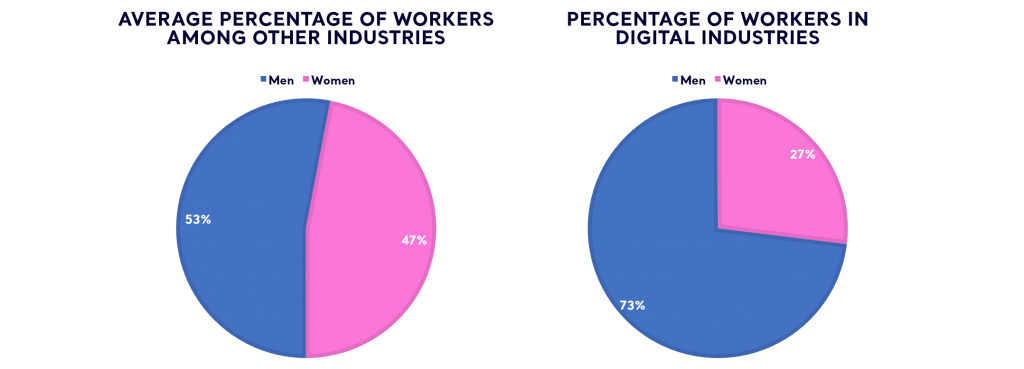The Future is Female was first introduced to empower women in the early 70s when it first appeared on a t-shirt for the first women’s bookstore in New York. Since then, it has had firm roots in feminism, and driving progressive change for women.
We believe women are the future of tech, and it’s imperative that we bring more women into the industry. We champion young women breaking into the tech industry by offering specialised digital apprenticeships to kickstart their career.
Current representation of women in tech

The tech industry is starving for better representation of women. The number of women assuming tech roles has dropped from 33%, that was previously reported in 2002, which shows women are either leaving the tech industry, or there is a stronger intake of men. Compared to other industries, where the average percentage of employed women is 47%, the tech industry is startlingly low with only 27% women in the workforce. There is a huge discrepancy between the number of women in the workforce, and the number assuming roles in IT. This number is only predicted to rise to 30% by 2020.
Even industry leaders have a huge problem with lack of representation of women. Only 17% of Google’s tech employees are women, 15% of Facebook’s staffing body are women, and only 10% of Twitter’s tech workers are women. The gender gap has recently been in the tech spotlight since the Google ‘anti-diversity’ memo which highlighted outlandish generalisations made about women in the industry.
The overall lack of women in the industry means that there are very few women in leadership roles. The number of women in tech roles is so low, that statistically the probability of women being in leadership roles is slimmer. In fact, out of the top 100 technology companies that currently operate all over the globe; only 14% of the board seats are sat in by women. These are just the major international companies; so, the numbers undoubtedly become even fewer in smaller tech businesses. Without more women in leadership positions, young girls aspiring to be in the tech sector have fewer female role models to aspire to.
So, why aren’t there more women in tech?
Women have been at the forefront of technological innovation since it began. We’ve heard the stories of inspirational women such as Dorothy Vaughn, who taught herself, and her staff, coding then proceeded to head the programming division at Langley. Then there’s Dame Stephanie Shirley, who started her career as a mathematical clerk in a post office, and later pioneered an incredibly successful all-women software company in the 1960s: we had the pleasure of interviewing Dame Stephanie in our case study. But, what’s changed? As a society, we’re immersed in tech more than ever before; this should be translating to an influx of new talent into the industry.
There is a disconnect between perception of jobs in tech, and the reality.
Technology is all about connection: it’s working with people, and bringing together a community. You won’t be left isolated working on a computer alone – you’ll be part of a team of forward thinking people, like you, who are making their future a reality.
But, what if I don’t have the skills for the tech industry?
Breaking into a niche industry always seems difficult, until it’s done. The fact is, technology is a part of everything we do; so, even if a career in tech hasn’t immediately occurred to you, it’s totally within reach. Young people have a level of digital competence that puts them ahead of the technological learning curve. This foundation knowledge is easy to build upon, and expand a specialised understanding of tech. All the skills you need to succeed can be learned easily by following the guidance, and teachings of industry experts.
Plus, even skills that may not seem relevant have practical applications in tech. We interact with technology every day, being savvy on social media is a valuable skill in the industry: use it. And, if you want to boost your existing skills more there are lots of free resources such as GitHub, or Google’s Digital Garage, who help people develop specialised skills in coding.
Change the Ratio
It’s time to tip the scales; let’s create more opportunities for women to get involved in the tech industry!
Make your mark on the fastest growing industry in the world! Click here to find out more about our apprenticeship programmes.
Ready to start your future right now? Click here to see our latest vacancies.
Next week, we’re going to look at some of the fantastic initiatives already out there getting more women into tech!
.